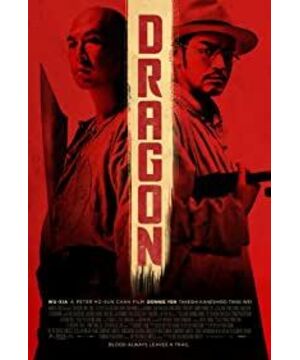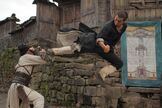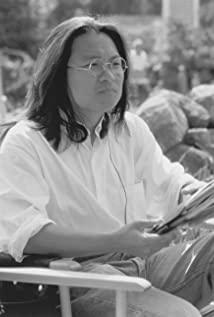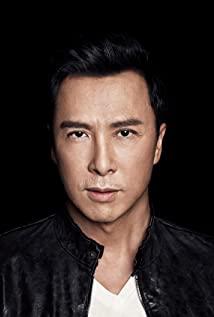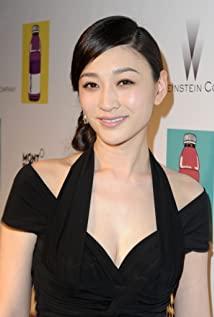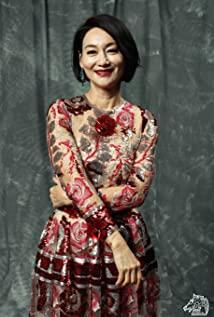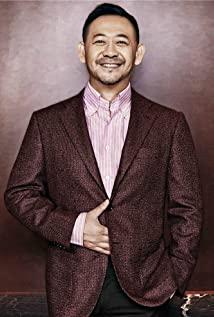From a narrative point of view, the two-phase structure obviously hurts the integrity of the story, but the director Chen Kexin has a good control of the sense of rhythm. Shengsheng has forged "Martial Arts" into an ancient rock drama, from sound effects to editing, and even The overall scheduling of the film is airtight, and watching the 120-minute film, it is not at all disorganized.
Jin Chengsang’s performance is okay. It is said that in the past two years, Jin Chengsang and Director Chen have cooperated more with "If·Love" and "Vote for Name". The actor's strengths are used to create roles. The lonely and introverted Xu Baijiu is somewhat similar to Jin Chengsang. But the biggest regret lies in the voice of Jin Cheng-sang. The original soundtrack of Jin Cheng-sang is very admirable, but his Sichuan-Dian accent is so impressive. In fact, the main character of the whole "Martial Arts" is only one of him who speaks a dialect. This seems a bit superfluous. Xu Baijiu is said to have been educated, so his Chinese proficiency is not so bad. You must use dialects to highlight Jinchengsang. Why don't you find a voice actor? For such a big investment film, you should not be short of this amount of money.
There is a basis for saying that Xu Baijiu was educated. When Jincheng-san first appeared on the stage, I immediately thought of "The Headless Horseman". In this film, Johnny Depp, dressed in ancient costume, also came to a closed mountain village, trying to use his "scientific knowledge" to uncover a supernatural power. Case. Of course, "Martial Arts" is not so ancient, it happened in the early years of the Republic of China, but it took place in the wild southwestern border. On the whole, there is a sense of traveling back in time. As soon as Jincheng Sangfu appeared on the scene, he began to use his forensic knowledge to make a thorough analysis. It can be said that from this moment on, the film has entered the track of "case focus", a routine of criminal reasoning, plus relative The enclosed space has the tune of a Hollywood thriller and crime movie.
However, Jincheng-sang did not follow the Depp line. With the deduction of the case, Jincheng-sang's "Detective Galileo" temperament became more apparent. Who said that crime scene investigation is the patent of American TV series? Jin Chengsang did not fall short of Gleason in "Martial Arts", and he was naturally beautiful, with piercing eyes. He took Donnie Yen back to the scene of the crime and turned around, and then restored the truth of the crime in his mind. This reproduction of Kung Fu is really not covered.
All of Jinchengsang’s analysis of the case is based on modern scientific knowledge. It seems that the stalwart figure of “Mr. Goose City, the Chinese society in "Martial Arts" is much more prosperous.
From the perspective of modern science, Chinese Kung Fu and magic mean the same thing, but Dao Chen asked Jin Chengsang to explain medically and physics seriously in the film. The human nervous system, especially the vagus nerve, has become an important evidence to explain the strength of Yen Zidan’s martial arts; Jin Chengsang curbed the toxins in the body, controlled his spontaneous sympathy, and caused Mr. Zhen to fall into a state of suspended animation without breathing and blood pressure. It is achieved by triggering acupoints to affect the nervous system; and Yen Zidan’s light work is achieved by the method of suddenly lightening the quality in the scientific framework of Jinchengsang-without Fang Zhouzi, these statements are obviously not rigorous scientific explanations. But Director Chen asked Jin Chengsang to show his logic on the big screen with a single glance, which was not more interesting. More importantly, this mindset actually reflects Jin Chengsang's character: He firmly believes that human nature is unreliable, and only the external forces of logic, science, and the legal system, such as "modernity", are things we can rely on. From the beginning to the end, Jin Chengsang has practiced his outlook on life and values. Although in order to capture Yen Zidan, he cannot avoid bribery. However, Jin Chengsang's law enforcement must be strict, violations must be investigated, and the spirit of science first is absolutely consistent. .
In contrast, Yen Zidan is much more "slicker". Tang Long, the killer in the "Seventy-Two Devil", came to this small mountain village alone to survive after his conscience discovered that he changed his name to Liu Jinxi and played with Tang Wei. The village women married and raised children, and they were still working in a township enterprise—a local paper mill. A family of four went off to a well-off society just looking at it. However, this five-good family was quickly shattered by an unexpected murder case. Jin Chengsang, who broke the casserole and asked to the end, finally exposed Tang Long’s true identity. At this time, the "Seventy-two Devil" came to chase after him. Tang Long and the others couldn't beat it, so they went to the village to kill. At this time, "Martial Arts" had become a Chinese Kung Fu version of "History of Violence." Donnie Yen is burdened with new hatreds and old hatreds and has to fight hard. It should be said that at this point in the plot, the first half of the reasoning and investigation has completely ended, the suspense disappeared, and the rest is the action drama that Zhen Wuzhi directed and acted. It must be pointed out that compared with the old-fashioned and rigid Jin Chengsang, Zhen Daxia's ethics is much more dialectical. In his eyes, one person commits a crime in the world, and everyone is an accomplice. It should be said that this systemic sociological concept is quite new and has a subversive impact on Jincheng's dualistic ethics of good and evil. And this also made Xu Baijiu quickly sympathize with Tang Long, and the two big stars formed an alliance and officially began the process of countering the evil forces.
Director Chen used a lot of MV-style slow motion to show the charm of Uncle Zhen's martial arts. The shots were very beautiful. Even the red blood cells were featured. The kung fu film was so delicate that "Martial Arts" was the first to become popular. However, Zhen Wuzhi seems to have been deeply influenced by "Ip Man". The bridges where two fists are thrown alternately and quickly are like the routine of Wing Chun.
Grandpa Wang Yu’s appearance is obviously not just a simple tribute. The martyrs were very ambitious in their old age. After the baptism of the years, the golden swordsman of the year became more domineering. After seeing Tang Long's broken arm, Mr. Wang's roar of "what" made him an angry bullfight, which reminded people of the allusion of Wang Yangming's long roar in the dragon field.
"Seventy-two Disha" followed the cult line. The "teacher" had the power to seize the life and death of his subordinates. Tang Long's conscience discovered that he had rebelled against the teacher. The duel between him and the leader played by Mr. Wang was also It can be regarded as a coming-of-age ceremony of killing the father. In the film, Liu Jinxi's eldest son, who is not his own, also participated in the coming-of-age ceremony.
Tang Long broke his arm. Of course, this is a tribute to the masterpiece "One-Armed Knife" by Mr. Wang Yu. He is afraid of being young. Standing in front of Grandpa Wang, Da Xia Zhen, who is in his prime of life, is full of spirit. .
The fighting scene is very powerful, that is, the death of the leader is a bit sloppy, and Jin Chengsang, who came over carelessly, pierced the sole of the feet of Father Wang. It was a thunderstorm and windy weather. The leader obviously hadn’t studied modern physics and stood in the rain. Became a conductor, and only heard a thunder explosion, and the leader smoked.
It is worth mentioning that the frontier style of the film is also very interesting. If the mountain people want to express their feelings, they will always express their feelings by singing folk songs. But after Tang Long’s suspended animation, his ethnic minority brother reined in front of the corpse truck and sang a heartbreaking song. At that moment, he exaggerated the friendship between his hands and feet to the extreme. Compared with the ethnic minorities, the Han nationality is not admirable. Singing and dancing, with a background of ethnic minorities, seems to have made Director Chen Kexin another addiction to "If•Love".
At the end of the film, when Dou Wei's singing sounded, I suddenly wanted to ask: What is the relationship between this movie and "Martial Arts"?
(Timeline Special Article)
View more about Dragon reviews


